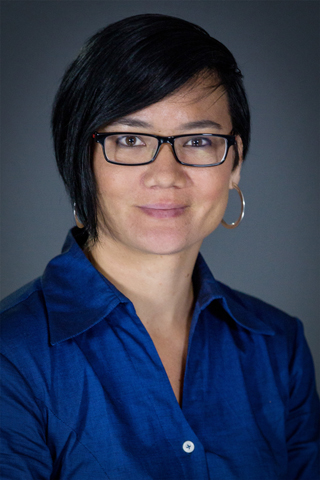
I use my background in motor control neuroscience and engineering to uncover the impact of violence and trauma on neurocognitive and neuromotor functioning, and develop technological solutions for vulnerable populations.
Charmayne Mary Lee Hughes directs the NeuroTech Lab. The Lab has developed mPOWERED – an intervention on intimate partner violence for health care providers. In collaboration with the University of Gondar in Ethiopia, NeuroTech Lab is working in a tele-rehabilitation system, ourReach. Its purpose is to address stroke rehabilitation for rural communities. The Lab is also examining sensorimotor and cognitive functioning changes that occur across the lifespan in the United States.
Bio:
Dr. Hughes completed her PhD in motor behavior with a specialization in motor control from Purdue University in 2010. She previously worked as a senior post-doctoral researcher in the Robotics Research Centre in the Department of Mechanical and Aerospace Engineering at Nanyang Technological University, a senior postdoctoral fellow at the Technical University of Munich, and a post-doctoral fellow in the Neurocognition and Action Research Group, Department of Psychology and Sport Sciences at Bielefeld University. She has also held joint appointments with the Research Institute for Cognition and Robotics (COR-Lab), and the Center of Excellence: Cognitive Interaction Technology (CITEC), both within Bielefeld University.
Her research focuses on elucidating the mechanisms underlying motor planning and control during goal-directed movements in neurologically healthy adults and children. In addition, she examines aspects of motor control in individuals with neurological deficits (e.g., stroke) and applies these results to the development of robotic devices that can improve their rehabilitation trajectories. Dr. Hughes’ work has been widely published in international peer-reviewed journals such as Frontiers in Neuroscience: Neural Technology, IEEE Transactions in Haptics, Brain & Behavior, and Experimental Brain Research.
Hughes, C.M.L., Tommasino, P., Budhota, A., & Campolo, D. (2015). Upper extremity proprioception in healthy aging and stroke populations, and the effects of therapist- and robot-based rehabilitation therapies on proprioceptive function. Frontiers in Human Neuroscience, 9, 15. DOI: 10.3389/fnhum.2015.00120.
Hughes, C.M.L., Baber, C., Bienkiewicz, M., Hazel, A., Worthington, A., & Hermsdörfer, J. (2014). The application of SHERPA (Systematic Human Error Reduction and Prediction Approach) in the development of compensatory cognitive rehabilitation strategies for stroke patients with left and right brain damage. Ergonomics, 15, 1-21. DOI: 10.1080/00140139.2014.957735.
Hughes, C.M.L., Seegelke, C., Spiegel, M.A., Oehmichen, C., Hammes, J., & Schack, T. (2012). Corrections in grasp posture in response to modifications of action goals. PLoS ONE, 7(9): e43015. DOI:10.1371/journal.pone.0043015.